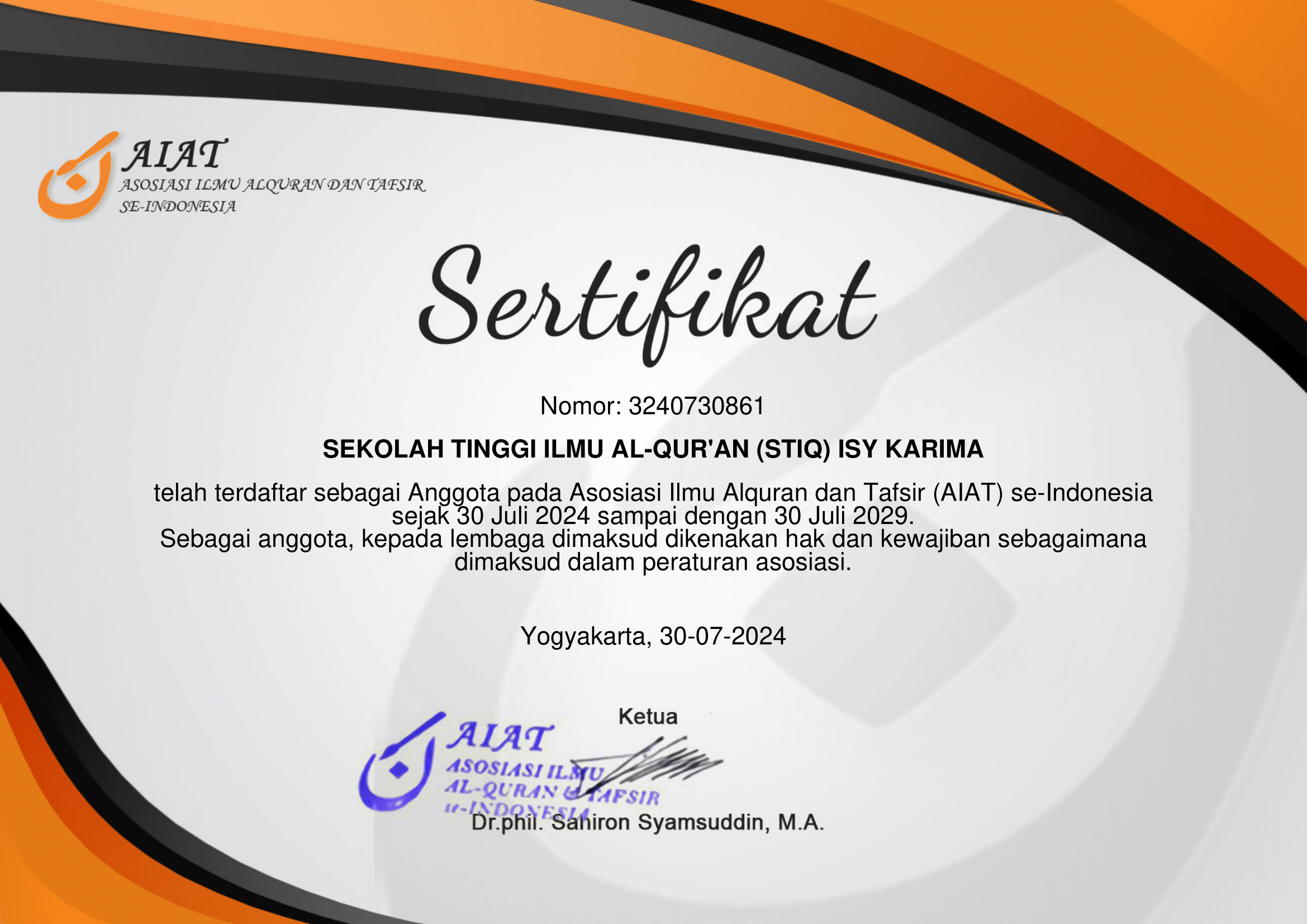The Discourse and Platforms and the Consolidation of Values Problems and Solutions
خطاب المنابر وترسيخ القيم الإشكاليات والحلول
DOI:
https://doi.org/10.58438/alkarima.v9i1.313Keywords:
Pulpit discourse, Human values, Rhetorical challenges, Modern media, Preacher trainingAbstract
The discourse of the pulpits has great importance in consolidating human values, especially after the diversity and multiplicity of its old means represented in mosques, and the new ones through modern technologies and social networks, especially in this era when human values have become secondary. In current study it has been presented that the problems of discourse in the curriculum, language, and content, as well as in the means. Some solutions have been developed through which some of its problems can be overcome. Thus, it can be employed in the consolidation of human values to the fullest. I have concluded that human values are an ethical system, an integrated, necessary, improving one that works to create an optimal life for humanity in a world of chaos, the moral rift, and the lack of influential preachers. The preachers who are good or proficient in rhetoric, and by codifying the crystallization of our rhetorical approach, which requires us to review our strategic plans in preparing the sermon, because the weakness of the pulpits is the weakness of the call. It is empty on its thrones, so the preacher must pay attention to the phenomena, and the problems that the listeners are looking for solutions to monitor them, solve them legally, and explain their advantages and disadvantages.
Downloads
References
Abu Dawud, Sulayman ibn al-Ash'ath. 2009. Sunan Abi Dawud. Ed. Shu'ayb al-Arna'ut. Beirut: Mu'assasat al-Risalah. Hadith no. 4530.
Amir, Abd al-Latif Muhammad. 1998. al-Qur'an wa-al-Qiyam al-Insaniyyah. Cairo: Maktabat Wahbah.
al-Bayhaqi, Ahmad ibn al-Husayn. 1999. al-Sunan al-Kubra. Ed. Muhammad Abd al-Qadir Ata. Beirut: Dar al-Kutub al-Ilmiyyah, vol. 10, p. 192.
Bint Muhammad, Aishah. 2018. “al-Qiyam al-Khuluqiyyah wa-Tahqiqiha li-Maslahat al-Fard wa-al-Jama'ah.” Majallat Kulliyat al-Dirasat al-Islamiyyah wa-al-'Arabiyyah lil-Banat bi-Damanhur. https://doi.org/10.21608/jcia.2018.23493
al-Bukhari, Muhammad ibn Isma'il. 1987. Sahih al-Bukhari. Ed. Mustafa Dib al-Bugha. Damascus: Dar Ibn Kathir.
Dar al-Ulum, Jami'at al-Minya. 2008. al-Mu'tamar al-Duwali al-Rabi': al-Thaqafah al-'Arabiyyah al-Islamiyyah: al-Wahdah wa-al-Tanawwu'. Al-Minya: Kulliyat Dar al-Ulum.
al-Fathi, Hamzah ibn Fayi'. 2020. Haybat al-Minbar. al-Maktabah al-Iliktruniyyah.
al-Fatlawi, Muhammad Kazim Husayn. 2012. al-Khitab al-Akhlaqi fi al-Qur'an al-Karim. Beirut: Dar al-Kutub al-Ilmiyyah.
Hawliyat Kulliyat Usul al-Din. 2005. Cairo: Al-Azhar University, Issue 22.
Ibn Kathir, Ismail ibn Umar. 1999. Tafsir al-Qur'an al-Azim. Ed. Sami ibn Muhammad al-Salamah. Riyadh: Dar Taybah.
Islamy, Mohammad Rindu Fajar. 2024. “Fostering Religiosity and Social Character through Islamic Educational Programs in the Context of Society 5.0.” Lentera Pendidikan: Jurnal Ilmu Tarbiyah dan Keguruan 27(2): 370–93. https://doi.org/10.24252/lp.2024v27n2i7
Jaridat Abu al-Hawl. Cairo, Issue 1345, 12 January 2022.
Lisan al-Arab. 1981. Ed. Abd Allah Ali al-Kabir, Muhammad Ahmad Hasballah, and Hashim Muhammad al-Shadhili. Cairo: Dar al-Ma'arif.
Majallat Kulliyat al-Dirasat al-Islamiyyah. 2019. Cairo: Al-Azhar University, Issue 35.
Mawqi' Mu'assasat al-Minbar al-Khayriyyah. Accessed March 5, 2025.
Moghaddasi, Ali. 2022. "Why the Dhul-Qarnayn's Dam Is Impenetrable? A Chemical and Physical Study." Journal of Interdisciplinary Qur'anic Studies 1(1): 71–82. https://doi.org/10.37264/jiqs.v1i1.5
Mu'assasat al-Multaqa al-Duwali al-Rabi' 'Ashar li-al-Madhhab al-Maliki. 2018. al-Ittijah al-Maqasidi fi al-Madhhab al-Maliki. Algeria: Dar al-Thaqafah, Wilayat Ayn al-Daflah.
Rabitat al-'Alam al-Islami. 2007. Mu'tamar Makkah al-Mukarramah al-Thamin: al-Khitab al-Islami wa-Ishkaliyyat al-'Asr. Makkah: Rabitat al-'Alam al-Islami.
Rajiyan al-Qathami, Sultan. 2024. “Mafhum al-Akhlaq fi al-Fikr al-Islami wa-al-Fikr al-Gharbi (Dirasah wa-Tafsil).” al-Majallah al-Duwaliyyah li-Nashr al-Buhuth wa-al-Dirasat, 209–228.
Rohanita, Lailatur, Mar’atul Fitriayu Azizah, Sholihah Sholihah, Mirrohmatillah Mirrohmatillah, and Nurul Aini. 2025. “The Relevance of Religious Knowledge in the Digital Age: A Quranic Guide for the Modern Generation.” Journal of Modern Islamic Studies and Civilization 3(01): 90–99. https://doi.org/10.59653/jmisc.v3i01.1386
Sa'd, Muhammad ibn. 2001. al-Tabaqat al-Kubra. Ed. Muhammad Abd al-Qadir Ata. Beirut: Dar al-Kutub al-Ilmiyyah.
Sahifat al-Muthaqqaf. Issue 5498, 21 September 2021.
al-Sharif, Muhammad ibn Musa. 2005. al-Khitab al-Islami: al-Waqi' wa-al-Ma'mul. Jeddah: Dar al-Andalus al-Khadra'.
Shabakat al-Ma'lumat al-Duwaliyyah (Internet). Accessed March 5, 2025.
al-Tayyar, Ahmad Abd Allah. 2005. “Ta'wil al-Khitab al-Dini fi al-Fikr al-Hadathi al-Jadid.” Kulliyat Usul al-Din, Cairo, p. 12.
al-Zayd, Hissah. 2017. “Mada Ta'aththur al-Qiyam al-Akhlaqiyyah bi-al-Taghayyurat al-Mu'asirah fi al-Mujtama' al-Sa'udi wa-Dawr al-Da'wah fi al-Hifaz 'alayha.” al-Tarbiyah (al-Azhar) 36(174): 257–333. https://doi.org/10.21608/jsrep.2017.6473
al-Zuhaili, Wahbah (taqdim). 2009. Sahih Muslim. Ed. Muhammad Fu'ad Abd al-Baqi. Beirut: al-Maktab al-Asriyyah.
Zaqzuq, Mahmud Hamdi. 2008. al-Fikr al-Dini wa-Qadaya al-'Asr. Cairo: Dar al-Rashad.
Downloads
Published
How to Cite
Issue
Section
License
Copyright (c) 2025 Aisyah Hasan

This work is licensed under a Creative Commons Attribution-ShareAlike 4.0 International License.
This work is licensed under a Creative Commons Attribution-ShareAlike 4.0 International License.











